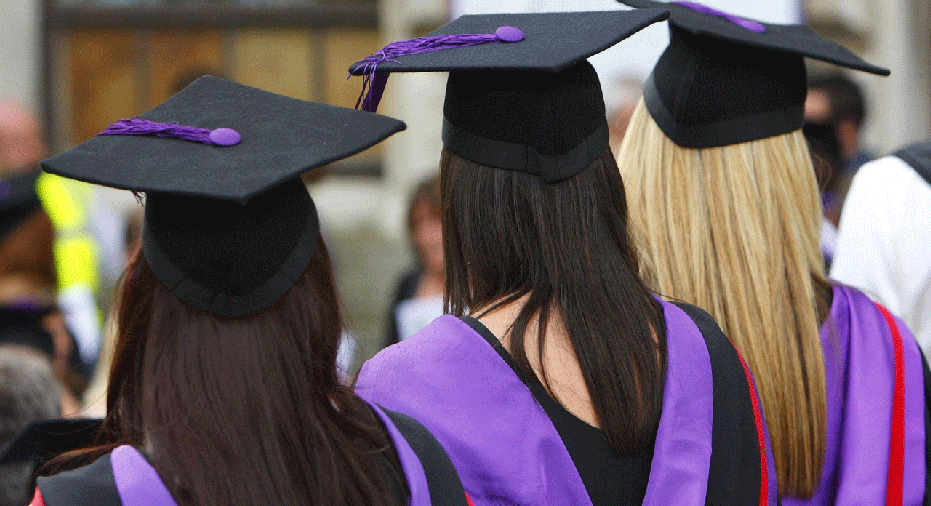Fewer Americans value a college degree

Americans are losing faith in the value of a college degree, with majorities of young adults, men and rural residents saying college isn't worth the cost, a new Wall Street Journal/NBC News survey shows.
The findings reflect an increase in public skepticism of higher education from just four years ago and highlight a growing divide in opinion falling along gender, educational, regional and partisan lines. They also carry political implications for universities, already under public pressure to rein in their costs and adjust curricula after decades of sharp tuition increases.
Overall, a slim plurality of Americans, 49%, believes earning a four-year degree will lead to a good job and higher lifetime earnings, compared with 47% who don't, according to the poll of 1,200 people taken Aug. 5-9. That two-point margin narrowed from 13 points when the same question was asked four years earlier.
The shift was almost entirely due to growing skepticism among Americans without four-year degrees -- those who never enrolled in college, who took only some classes or who earned a two-year degree. Four years ago, that group used to split almost evenly on the question of whether college was worth the cost. Now, skeptics outnumber believers by a double-digit margin.
Conversely, opinion among college graduates is almost identical to that of four years ago, with 63% saying college is worth the cost versus 31% who say it isn't.
Big shifts occurred within several groups. While women by a large margin still have faith in a four-year degree, opinion among men swung significantly. Four years ago, men by a 12-point margin saw college as worth the cost. Now, they say it is not worth it, by a 10-point margin.
Likewise, among Americans 18 to 34 years old, skeptics outnumber believers 57% to 39%, almost a mirror image from four years earlier.
Today, Democrats, urban residents and Americans who consider themselves middle- and upper-class generally believe college is worth it; Republicans, rural residents and people who identify themselves as poor or working-class Americans don't.
Research shows that college graduates, on average, fare far better economically than those without a degree. For example, the unemployment rate is 2.7% among college graduates, compared with 5.1% among high school graduates who never attended college, and Labor Department research shows that bachelor's degree recipients earn higher salaries than those who never went to college. But the wage premium of getting a degree has flattened in recent years, Federal Reserve research shows.
Student debt has surged to $1.3 trillion, and millions of Americans have fallen behind on student-loan payments.
"Costs have gone up considerably to the point that I think there are a number of people who maybe rightfully say, 'I'm not in the league of Harvard and maybe not even in the league of really good state schools,'" said Doug Webber, a Temple University econimics professor. Many of those Americans are concluding that paying high tuition at less-prestigious schools isn't worth it.
Some Americans believe learning a trade offers more security than going to college.
Jeff McKenna, a 32-year-old from Loveland, Colo., said he doesn't believe college is worth the cost. Mr. McKenna went to a trade school, earning a certificate as a mechanic, and now earns a base salary of about $50,000 a year. He said he's never gone three weeks without a job, including during the recession.
"I have friends from high school that are making half what I'm making, and they went and got a four-year degree or better, and they're still $50-, $60-, $70,000 dollars in debt," Mr. McKenna said. "There's a huge need for skilled labor in his country."
Growing skepticism of college, along with a strong labor market, are possible factors behind a decline in collegeenrollment this decade. Many schools have responded by cutting tuition or offering more scholarships.
Schools such as Michigan State, the University of Wisconsin system and the University of Florida are trying to improve their public standing with marketing efforts. In Wisconsin, the university system has taken out billboards across the state highlighting the impact alumni have had on the local economy.
"We're aware of the various polls that show this decline in confidence. It's happening across a wide variety of institutions," said Heather Swain, Michigan State's vice president for communications and brand strategy. "One of the things we're doing is to try and make sure people understand the value of the university in different ways."
The turn in public opinion is "somewhat startling to me," said University of Florida Provost Joseph Glover.
"I think this is happening," he said, "because there is a disconnect between the group of Americans who go to university and acquire an appreciation of life-long learning and another group people who never get access and never really understand the benefits a university brings to society at large."
Dr. Glover said the school sees its job as supplying the intellectual capital the state need to grow.
"The political winds can always change," he said, "but we believe we're providing tremendous value to the state."
Write to Josh Mitchell at joshua.mitchell@wsj.com and Douglas Belkin at doug.belkin@wsj.com




















